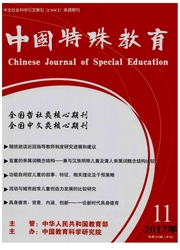

 中文摘要:
中文摘要:
本研究基于“溢出假说”和“人一情境交互作用理论”,选自北京、重庆和石家庄三所初中学校的1038名初一至初三学生为被试,采用问卷调查的方式,探讨家庭环境中的父母关系(父母冲突和父母婚姻满意度)、亲子关系(母子依恋和父子依恋)与青少年网络成瘾的关系,以及父母关系是否会通过亲子关系影响青少年的网络成瘾。结果表明:(1)父母婚姻满意度、父子依恋和母子依恋均与青少年网络成瘾呈显著负相关,而父母冲突与青少年网络成瘾呈显著正相关;(2)母子依恋、父母婚姻满意度和父子依恋能显著负向预测青少年的网络成瘾,但父母冲突却不能;(3)父子依恋和母子依恋在父母冲突对青少年网络成瘾的影响中起完全中介作用,但在父母婚姻满意度对青少年网络成瘾的影响中只起部分中介作用。
 英文摘要:
英文摘要:
This study, by using questionnaires to test 1038 students from three lower secondary schools in Beijing, Chongqing and Shijiazhuang based on the Spillover Theory and the Person-Context Interaction Theory, aims to explore the relationship between the interparental relationship (interparental conflicts and parents' marital satisfaction), the parent-child relationship (mother-child attachment and father-child attachment), and adoles- cents' Intemet addiction, as well as whether the interparental relationship has an effect on adolescents' Intemet addiefion through the parent-child relationship. The results show the following: (1) the parents' marital satisfac- tion, father-child attachment, and mother-child attachment are negatively correlated with the adolescents' Inter- net addiction, whereas interparental conflicts are positively correlated with the adolescents' Intemet addiction; (2) mother-child attachment, parents' marital satisfaction, and father-child attachment, rather than interparental conflicts, can help negatively predict the adolescents' Intemet addiction; (3) the effect of interparental conflicts on the adolescents' Intemet addietion is totally mediated by father-child attachment and mother-child attachment, whereas the effect of the adolescents' parents' marital satisfaction on their Intemet addiction is only partly medi- ated by father-child attachment and mother-child attachment.
 同期刊论文项目
同期刊论文项目
 同项目期刊论文
同项目期刊论文
 The explicit and implicit outcome expectancies of Internet games and their relationships with Intern
The explicit and implicit outcome expectancies of Internet games and their relationships with Intern Perceived parent-adolescent relationship, perceived parental online behaviors and pathological Inter
Perceived parent-adolescent relationship, perceived parental online behaviors and pathological Inter Decreased functional connectivity between ventral tegmental area and nucleus accumbens inInternet ga
Decreased functional connectivity between ventral tegmental area and nucleus accumbens inInternet ga Impaired decision-making under risk is associated with gaming-specific inhibitiondeficits among coll
Impaired decision-making under risk is associated with gaming-specific inhibitiondeficits among coll 期刊信息
期刊信息
